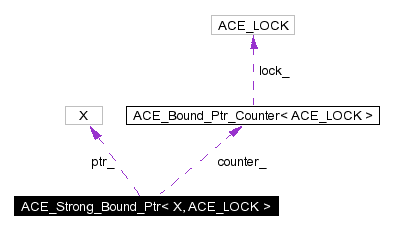|
Public Methods |
| ACE_EXPLICIT | ACE_Strong_Bound_Ptr (X *p=0) |
| ACE_EXPLICIT | ACE_Strong_Bound_Ptr (auto_ptr< X > p) |
| | ACE_Strong_Bound_Ptr (const ACE_Strong_Bound_Ptr< X, ACE_LOCK > &r) |
| | Copy constructor binds <this> and <r> to the same object.
|
| | ACE_Strong_Bound_Ptr (const ACE_Weak_Bound_Ptr< X, ACE_LOCK > &r) |
| | Constructor binds <this> and <r> to the same object.
|
| | ~ACE_Strong_Bound_Ptr (void) |
| | Destructor.
|
| void | operator= (const ACE_Strong_Bound_Ptr< X, ACE_LOCK > &r) |
| | Assignment operator that binds <this> and <r> to the same object.
|
| void | operator= (const ACE_Weak_Bound_Ptr< X, ACE_LOCK > &r) |
| | Assignment operator that binds <this> and <r> to the same object.
|
| int | operator== (const ACE_Strong_Bound_Ptr< X, ACE_LOCK > &r) const |
| int | operator== (const ACE_Weak_Bound_Ptr< X, ACE_LOCK > &r) const |
| int | operator== (X *p) const |
| int | operator!= (const ACE_Strong_Bound_Ptr< X, ACE_LOCK > &r) const |
| | Inequality operator, which is the opposite of equality.
|
| int | operator!= (const ACE_Weak_Bound_Ptr< X, ACE_LOCK > &r) const |
| | Inequality operator, which is the opposite of equality.
|
| int | operator!= (X *p) const |
| | Inequality operator, which is the opposite of equality.
|
| X * | operator-> (void) const |
| | Redirection operator.
|
| X & | operator * (void) const |
| | Dereference operator.
|
| X * | get (void) const |
| | Get the pointer value.
|
| void | reset (X *p=0) |
| void | reset (auto_ptr< X > p) |
| int | null (void) const |
Public Attributes |
| | ACE_ALLOC_HOOK_DECLARE |
| | Declare the dynamic allocation hooks.
|
Private Types |
typedef ACE_Bound_Ptr_Counter<
ACE_LOCK > | COUNTER |
| | The ACE_Bound_Ptr_Counter type.
|
Private Attributes |
| COUNTER * | counter_ |
| | The reference counter.
|
| X * | ptr_ |
| | The underlying object.
|
Friends |
| class | ACE_Weak_Bound_Ptr< X, ACE_LOCK > |
Assigning or copying instances of an ACE_Strong_Bound_Ptr will automatically increment the reference count of the underlying object. When the last instance of an ACE_Strong_Bound_Ptr that references a particular object is destroyed or overwritten, it will invoke delete on its underlying pointer.


 1.2.18
1.2.18